2006: Twelve Overlooked Books
by Jeff VanderMeer
special to Locus Online
At night, some species of moths drink the tears of sleeping birds. This act, which evokes the most limpid (and, admittedly, purple) of prose styles, occurs without any of us ever knowing it. But it has meaning, even if it is simply by implication. As we sleep, we may be awakened by a movement outside, a sudden sound or suggestion of a sound, that has no context. What it means becomes what it means to us. All we really know is that the events of another context have passed by, perhaps even a whole set of other experiences, about which we may never know more.
In a similar way overlooked books tend to be half-seen, somewhat mysterious. Perhaps we view them in one context when they deserve another, wider context. Or perhaps we misunderstand them more fundamentally and thus dismiss them. Other books simply never find any audience, hindered by small print runs or the vagaries of fate or season. We feel their presence to some extent, through an attenuated sense of their passing through the public world, but we never encounter them directly.
All of which is a rather fecund way of saying: Here are twelve books you may not have discovered in your journeys through the literary world in 2006.
- - -
 #1 - The Unblemished by Conrad Williams (Earthling Publications, $45, limited edition hardcover, 367 pages)
#1 - The Unblemished by Conrad Williams (Earthling Publications, $45, limited edition hardcover, 367 pages)
This horrific, intense, and frightening tour de force evokes comparisons to the early prose style of Clive Barker and demonstrates a control of language comparable to M. John Harrison, among others. Williams' honesty in his writing carries through to his portrayals of the often doomed characters. With its unwavering gaze, The Unblemished demonstrates that horror can be visceral and literary. Transgressive, unrelenting, but also oddly gentle and humane at times. You won't be able to look away — or put it down.
-
 #2 - The Wizard of the Crow by Ngugi Wa Thiong'o (Pantheon, $30, hardcover, 766 pages)
#2 - The Wizard of the Crow by Ngugi Wa Thiong'o (Pantheon, $30, hardcover, 766 pages)
This absurdist, capering circus of magic realism and exaggeration found on many year's best lists for mainstream fiction has not received much attention in genre circles. It should. Set in an imaginary African country, The Wizard of the Crow features a dictator intent on building the highest tower in the world — one that reaches beyond Earth's atmosphere — and a cabinet of ministers who outdo each other in surgical modifications. For example, the Minister of State, responsible for spying on citizens, has his ears enlarged. The opening sequence, with its summary of proposed theories for why the dictator has fallen ill, is classic. I've rarely read a novel so entertaining and yet so essential.
-
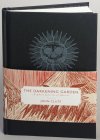 #3 - The Darkening Garden: A Short Lexicon of Horror by John Clute (Payseur & Schmidt, $45, limited edition hardcover, 162 pages)
#3 - The Darkening Garden: A Short Lexicon of Horror by John Clute (Payseur & Schmidt, $45, limited edition hardcover, 162 pages)
Payseur & Schmidt has quickly gained a reputation for producing beautiful little books. With Clute's The Darkening Garden, they've created something extraordinary. Every aspect of the book is a dark delight, from the endpapers to the illustrations chosen by Jacob McMurray to accompany Clute's text. But a beautiful book is just a kind of elaborate facade without contents worth reading. Clute's thirty short explorations of various types of horror transform this beautiful book into an essential one. With titles like "Affect Horror," "Petrification," "Serpent's Egg," and "Thickening," Clute's observations about horror seem both penetrating and faintly mysterious, an effect intensified by the book's design. In a very real sense, you don't even need to be familiar with the texts Clute cites in his summations to enjoy The Darkening Garden.
-
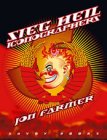 #4 - Sieg Heil Iconographers by Jon Farmer (Savoy Books, 25 pounds, large-sized trade paper, 608 pages)
#4 - Sieg Heil Iconographers by Jon Farmer (Savoy Books, 25 pounds, large-sized trade paper, 608 pages)
Once again Savoy Books, as in its International Horror Guild Award-winning A Serious Life, turns its bibliomaniacal eye on itself, this time with Jon Farmer providing context and justification for such Savoy books as Lord Horror. The result is in some ways more direct and transgressive than A Serious Life, as this volume is less about the counter-cultural context and connection to figures like William Burroughs and more about the symbolism and imagery of that context. Farmer's essay, threaded through the stunning graphics and layout compiled/created by the incomparable John Coulthart, is fascinating in its discussion of Savoy, even if it rambles at times. Sieg Heil Iconographers possesses the main trait of most Savoy books I've read: a confrontational, visceral element wedded to a fierce intelligence.
-
 #9 - Knots by Wendy Walker (Aqueduct Press, $9.00, trade paper, 121 pages)
#9 - Knots by Wendy Walker (Aqueduct Press, $9.00, trade paper, 121 pages)
Quietly, almost stealthily, L. Timmel Duchamp's Aqueduct Press has been publishing a series of short fiction and essay collections under their Conversation Pieces imprint. The books are plain, adorned with what looks like clip art placed on duotone covers. Conversation Piece books are no-nonsense, focused solely on the content. As delivery systems for new, little-known, or marginalized writers, they work very nicely. Knots features four previously published stories by Wendy Walker, author of the cult classic The Secret Service. The central tale, "The Twin Knots," is a tour de force of plot and description. In reading these stories, or those in other Conversation Pieces titles (like The Traveling Tide by Rosaleen Love), I get the sense, again, in a different context, of those moths gathering moisture from the eyes of sleeping birds — in that there's an undercurrent here of traditions and approaches to fiction that are not part of the mainstream discussion, in or out of genre. Even though the series can be uneven, this is valuable work and deserves to be supported.
-
 #5 - Strange Birds: Inspired by the Artwork of Lisa Snellings-Clark by Gene Wolfe (Dream Haven Books, $10, limited edition chapbook, 40 pages)
#5 - Strange Birds: Inspired by the Artwork of Lisa Snellings-Clark by Gene Wolfe (Dream Haven Books, $10, limited edition chapbook, 40 pages)
Moths and birds. This gorgeous chapbook has that kind of delicate, mysterious, nocturnal feel to it. Snellings-Clark's artwork is primitive yet oddly precise, both threatening and playful at the same time. Wolfe's two original stories in the chapbook, "On a Vacant Face a Bruise" and "Sob in the Silence" are an odd sort of comfort food, satisfying and yet, behind the mundane details, very strange indeed.
-
 #6 - Twenty-Six Lies/One Truth by Ben Peek (Wheatland Press, $14.95, large-sized trade paper, 152 pages)
#6 - Twenty-Six Lies/One Truth by Ben Peek (Wheatland Press, $14.95, large-sized trade paper, 152 pages)
Ben Peek is a writer I fully expect to blunder out into the scene like a run-away brontosaurus one of these days. He has titanic talent generally leashed to micro-detail projects when his true canvas is probably something much wider and deeper. Twenty-Six Lies/One Truth is a gently experimental text that uses a glossary of terms from A to Z to create vignettes, one-liners, and other supports for loosely connected narratives. Some are funny, some are most definitely not funny. All are lively and deserve your attention.
-
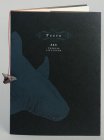 #7 - Teeth, Therese Littleton (Payseur & Schmidt, $10, limited edition chapbook, 18 pages)
#7 - Teeth, Therese Littleton (Payseur & Schmidt, $10, limited edition chapbook, 18 pages)
Rarely has a skin so matched the contents on a book, with Littleton's story sheathed in an immersive design, complete with a shark's tooth placemarker. The results are sleek and tactile, from the paper choices to the texture of the illustrations. The story, in a sense, cannot be flensed from the design; they are chemically combined. Littleton is a concise and observant writer, and this shark tale will delight the reader, as will the wicked author photo.
-
 #8 - When They Came by Don Webb (Temporary Culture, $22.50, trade paper, 222 pages)
#8 - When They Came by Don Webb (Temporary Culture, $22.50, trade paper, 222 pages)
Mr. Webb has been somewhat Absent in recent years, but Temporary Culture, a vehicle of Henry Wessells, a book expert, publisher, and accomplished writer, has collected fifteen original stories, added ten reprints, and provided a much-needed new collection of Webb's fiction. This particular volume has a definite Lovecraftian vibe to it, eschewing Webb's more original approaches to short fiction. Still, this concise, sharp volume is a great introduction to Webb's fiction for the reader unfamiliar with his work and a welcome reminder of his talent for the rest of us.
-
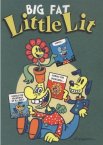 #10 - Big Fat Little Lit edited by Art Spiegelman & Francoise Mouly (Puffin Books, $14.99, oversized trade paper, 144 pages)
#10 - Big Fat Little Lit edited by Art Spiegelman & Francoise Mouly (Puffin Books, $14.99, oversized trade paper, 144 pages)
An absolute delight, this anthology of raucous, often fantastical comics collects the best of the New York Times Little Lit series. In bright, detailed full-color, readers will find wonderful material from such familiar names as Neil Gaiman, Gahan Wilson, and Lemony Snicket. Kaz's "The Hungry Horse" is a favorite, as is Kim Dietch's insane "These Cats Today." Exuberant and playful, this is the kind of book that, as the cliché goes, adults and children can both enjoy — even if you don't usually read comics.
-
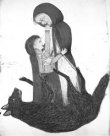 #11 - Fairy Tale Review edited by Kate Bernheimer (University of Alabama, Dept. of English, Tuscaloosa, AL 35487, subscriptions $10 a year)
#11 - Fairy Tale Review edited by Kate Bernheimer (University of Alabama, Dept. of English, Tuscaloosa, AL 35487, subscriptions $10 a year)
Meticulously and without much fanfare, Kate Bernheimer has been editing a rather wonderful literary magazine devoted to fiction, nonfiction, and poetry with a foundation in folktale, fairytale, and myth. The advisory board includes Marina Warner and Jack Zipes. Contributors in 2006 included Rikki Ducornet, Donna Tartt, and Stacey Levine, among many others. There's a certain adult seriousness and adult playfulness to Fairy Tale Review that I find lacking from many anthologies and magazines devoted to this kind of fiction. In fact, I don't particularly like re-told fairy tales, but there's enough variety and ingenuity in this publication to interest me and, I'm sure, many other readers.
-
 #12 - The Summer Book by Tove Jansson (Sort of Books, trade paper, 160 pages)
#12 - The Summer Book by Tove Jansson (Sort of Books, trade paper, 160 pages)
Creator of the marvelous Moonin series of books and comics for children, Jansson also wrote adult fiction. In this slim collection of stories about a grandmother and granddaughter living on an island off of Finland, Jansson conveys so much deep characterization that the book resonates long after you read it. Lovely vignettes about building miniature cities and the interweaving of folktale and tall tale give much of The Summer Book a fantastical feel. Crisp and sometimes poignant, this was my favorite read of 2006 (although originally published in the 1970s).
- - -
(Note: Other books I considered for this piece, but ultimately felt have or will receive the attention they deserve: Liz Williams' The Snake Agent, Catherynne Valente's The Orphan's Tales: In the Night Garden (Bantam/Spectra), Nick Mamatas' Under My Roof (Soft Skull Press), Dustin Long's Icelander (McSweeney's), Laird Hunt's The Exquisite (Coffee House Press).
Jeff VanderMeer is the author of Shriek: An Afterword.
Comments are welcome, but are moderated. Anonymous comments will not be posted.



0 Comments:
Post a Comment
<< Home